Reading the Sermon on the mount : character formation and decision making in Matthew 5-7 /
Material type: TextPublication details: Columbia, S.C. : University of South Carolina Press, ©2004.Description: 181 Pages. ; 23 cmISBN:
TextPublication details: Columbia, S.C. : University of South Carolina Press, ©2004.Description: 181 Pages. ; 23 cmISBN: - 080103163X
- 9780801031632
- 226.9/06 22
- BT380.3 .T35 2004
| Item type | Current library | Collection | Call number | Copy number | Status | Date due | Barcode | |
|---|---|---|---|---|---|---|---|---|
 Books
Books
|
SAIACS General Stacks | Centre for South Asia Research (CSAR) | 226.9 T137R (Browse shelf(Opens below)) | C.3 | Available | 048723 | ||
 Books
Books
|
SAIACS General Stacks | Non-fiction | 226.9 T137R (Browse shelf(Opens below)) | C.2 | Available | 039681 | ||
 Books
Books
|
SAIACS General Stacks | Non-fiction | 226.9 T137R (Browse shelf(Opens below)) | C.1 | Available | 038699 |
Includes bibliographical references (p. [149]-160) and indexes.
The Sermon on the Mount is one of the most familiar passages in the New Testament. In this concise and clearly-written introduction to and commentary on the Sermon, Charles Talbert pays particular attention to its role in character formation and ethical decision making. After introductory chapters on reading the Sermon on the Mount, the book offers a section-by-section commentary. Talbert points out structural highlights, provides illuminating cross-references to Jewish and Greco-Roman literature, and concludes each section with a consideration of how it contributes to character formation and how it can be used with the rest of Scripture for ethical decision-making. The book is packed with insights that will be of great use to students as well as those who preach and teach the Sermon.
"In Reading the Sermon on the Mount, Charles H. Talbert explores the religious message put forth in the first large teaching section of the Gospel according to Matthew and finds it to have a relevance often overlooked in academic studies. Seeking to hear and understand the text of Matthew 5-7 as someone living in the Mediterranean about 100 C.E. would have encountered it, Talbert argues for a broader interpretation of the Sermon than scholars typically advance. He suggests that the Sermon cannot be reduced to a discussion of ethics but includes considerations of piety. He contends that it is a text about covenant fidelity to God and to other humans, in which Jesus seeks to affect perceptions, dispositions, and intentions. The text thus functions primarily as a catalyst for character formation rather than as a compendium of obligations."--BOOK JACKET.
There are no comments on this title.

